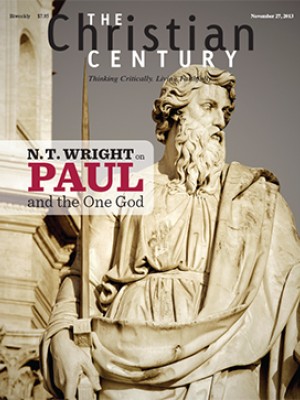Sunday, December 1, 2013: Isaiah 2:1-5; Romans 13:11-14; Matthew 24:36-44
In the social media I often read about a Christian community that has excluded an innocent person or demonized a marginalized group. The writer then juxtaposes this with a pithy saying from Jesus about loving all persons. And there you have it—we Christians are exposed as two-faced and heartless, insensitive to anything but our own proclamations of righteousness.
If you’re like me and many others in the progressive, socially aware, justice-minded, post-Christendom community, the criticisms based on these caricatures seem easy to brush off (they’re straw figures begging to be knocked down). After all, it’s not true that we judge people as they’re coming through the door; instead we do everything we can to honor their experience and perspective. We work for inclusion of all persons, and create programs to help provide disadvantaged and isolated people with the means of connection and dignity. We don’t hit everyone over the head with the gospel; we honor other faiths and perspectives. Most of all, we do our best to avoid implying that those who do not share our beliefs or practices are cut off from God’s grace.
Read our latest issue or browse back issues.
Our polite and careful articulations of faith help us avoid offending those who might be looking for a reason to reject a relationship with Jesus Christ. But does our Christianity have anything that’s truly compelling about it? Imagine how Paul’s words stirred the hearts of believers in Rome as they wondered if they could remain true to their faith in an empire that was so hostile to their faith and to them. Would a message about accommodating the powers around them have served them as well as the bold exhortation that lifted up contrasting images: life in an oppressive empire and life in God’s new day?
As we provide guidance to members of our communities in these complex times, I wonder whether our public articulations of the situations we face are faithful to the ministry of Jesus. We try to give Christians a useful perspective on the legislative quagmires of health care, gun control or budgets; we get caught up in statistics, legal precedents and lobbying powers. We share guidance from our confessions and denominational statements. When we attempt to sway our leaders on policy issues—emissions and the environment, human rights violations or military aid—we avoid painting anyone as wholly bad, point out where we might not be so good and scramble to articulate the dizzying complexity of each dilemma.
But do we articulate a clear, spiritual rationale that encourages individual believers to take a strong position in any of these debates? Or do we stop short of staking any claim about where Jesus Christ calls us to stand on an issue? When we encourage our members to invite their unchurched neighbors and friends to visit our worshiping communities, we instruct them on how not to offend others with outdated assumptions, how not to sound judgmental or overbearing, how not to imply that there’s a certain type of person that we’re looking for. But do we teach those same members how to tell a truly inspiring story about what faith in Jesus and life in a community lived out in his name have meant in their lives?
Paul presented a night-and-day scenario to Christians in ancient Rome; there really was no in-between for them. Either they were right about Jesus’ message that God wanted their focus to be on living for a world that was yet to come—or they were dead wrong and were risking persecution and worse for a the sake of a lie. In Matthew’s Gospel, Jesus is speaking to people who are desperate for salvation from foreign domination and from local collaborators who were selling out their own communities for personal gain. Jesus is telling these Judeans that they could either live their lives according to the broken reality in front of them or live in the hope of a different reality to come—they couldn’t do both.
Do we engage in a faith that takes seriously the stark opposition of life according to worldly reality and life according to God’s vision for us? Is it possible that we have for so long tried to avoid the stigma of hypocrisy—tried not to live in ways that fail to prove what we preach—that we’ve steered clear of providing any clear and inspiring vision? In my conversations with people who avoid religious affiliation (or who have left the church) I have ceased to be sad when they point to examples of hypocrisy; I can’t control what all other Christians choose to say or do. But I am increasingly troubled when these same people cannot also point to inspiring, positive examples of Christian faithfulness.
Douglas John Hall encourages us to stop struggling against the decline of Christian centrality in North American life. He argues that if the church could stop worrying about having less power and less influence, it might actually discover a new freedom to be a compelling force for faithful engagement with the rest of society. In some sense, he’s calling on us to embrace the wisdom of one of my favorite postmodern antiheroes, Fight Club’s Tyler Durden: “It’s only after we’ve lost everything that we’re free to do anything.”
Those of us in progressive mainline churches haven’t lost everything . . . yet. But we can do and be more if we embrace the freedom of our new marginalization. We can take hope in knowing that an enduring image of peace—swords turned into plowshares—was born out of the desperation of a small and vulnerable nation that was trapped between mighty empires.






